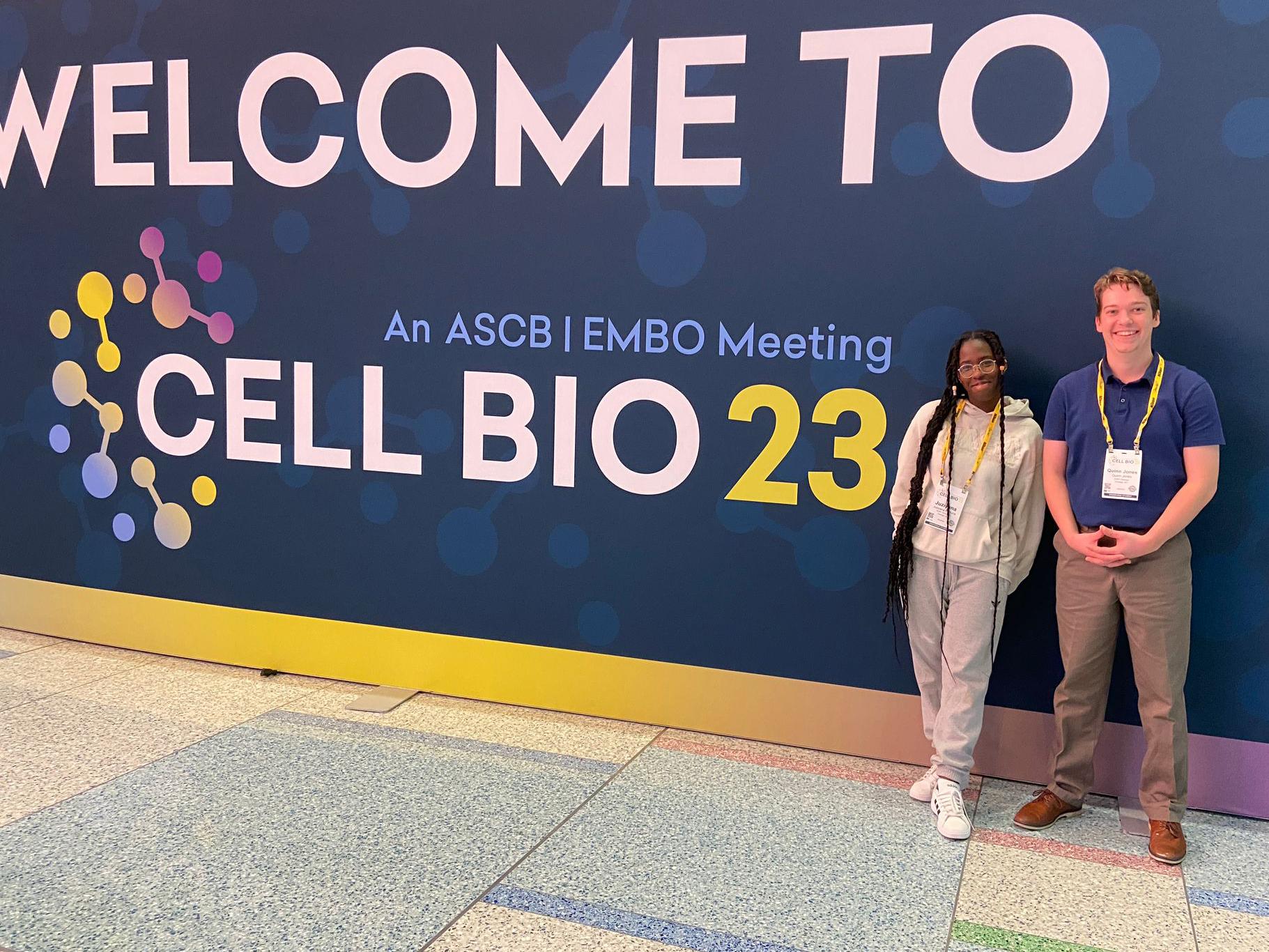SUNY Oswego biological sciences students (from left, above) Juziyana Fortuna and Quinn Jones presented research they are conducting under the mentorship of faculty member Yulia Artemenko at Cell Bio 2023 –- a joint meeting of the American Society for Cell Biology and European Molecular Biology Organization. The poster titles were “Examination of the role of the glycocalyx in shear flow-induced migration of Dictyostelium discoideum” (Fortuna) and “Restriction enzyme-mediated integration mutagenesis screen to identify novel partners of adhesion regulator Kinase Responsive to Stress B (KrsB) in Dictyostelium discoideum” (Jones). Funds from the university’s Student Office of Research and Creative Activities (for both) and the Confocal Imaging Fund Undergraduate Travel Fund (for Fortuna) supported attending this international conference, which took place in Boston from Dec. 2 to 6.
Physics professor Carolina Ilie, along with SUNY Oswego alumna Lauren Samson (now a Ph.D. student at the University at Buffalo) and current student Katherine Shene published a review paper in Crystals, (section Inorganic Crystalline Materials) titled "Lithium Tetraborate as a Neutron Scintillation Detector: A Review.” They started this work two years ago, when they participated in the summer research program at University of Nebraska at Lincoln.
Physics professor Shashi Kanbur and a team of collaborators published a paper, “A theoretical framework for BL Her stars $-$ II. New period-luminosity relations in the $Gaia$ passbands” in the journal Astronomy & Astrophysics. Kanbur also has earned telescope time at the Gemini Observatory for his research project “Probing possible helium enhancement in RR Lyrae stars in metal-rich bulge globular cluster NGC 6388.”
In fall 2023, communication studies faculty member Ulises A. Mejias published the peer-reviewed article ”Sovereignty and its Outsiders: Data Sovereignty, Racism, and Immigration Control” at the Weizenbaum Journal of the Digital Society (Berlin). He also joined the Núcleo Milenio Futures of Artificial Intelligence Research (FAIR, Chile) as a senior researcher. During the semester, Mejias was invited to present talks at the Danish Institute for International Studies, University of Leeds, University of Marburg, and Pontificia Universidad Católica de Chile. In addition, he published a short article for the Barcelona newspaper La Vanguardia and an op-ed for Al Jazeera titled ”AI and the tyranny of the data commons." Mejias also co-taught the course ”Digital revolution and Data Economy,” offered by the Universidad Abierta de Recoleta in Chile.
Georgina Whittingham, of the modern language and literatures department, and Carolyn Malloy published a new Spanish-to-English translation of “The Children of La Malinche” by Hugo Salcedo in the fall 2023 issue of The Mercurian: A Theatrical Translation Review. Whittingham described the text, originally titled "Los hijos de la Malinche" (2014), as “a theatrical masterpiece authored by the renowned Mexican playwright,” which “utilizes various theatrical styles and strategies to showcase unforgettable characters from key moments in Mexican history, politics and literature.” In the play, Salcedo portrays remarkable heroes and everyday citizens striving for the betterment of their nation against antagonists looking to perpetuate the legacy of colonial exploitation. The groundbreaking dramatic work also employs satire to produce cutting and hilarious humor while exposing the foolishness and flaws of characters.
Communication studies faculty member Jason Zenor published a pair of articles on the intersections of communication law and technology. "Tales Out of School: Delineating Student Speech Protections for the Digital Age," published in the University of New Hampshire Law Review, responds to the U.S. Supreme Court case Mahanoy School District v. B.L. (2021), in which the Court held that schools can regulate off-campus speech within limited circumstances. “But with the line between education and politics blurring, there is a concern as to how this power will be used,” Zenor noted. “The paper offers a way to clarify the rule by creating a parallel to the public employee speech test.” In "We’ll be Keeping AI on You! How Artificial Intelligence Could Escalate Cancel Culture," published in the Communication Law Review, Zenor article explores how advancements in artificial intelligence could be exploit an online “'cancel culture” through “increasing surveillance, doxing, deepfakes, and algorithmic bias toward outrage,” Zenor explained. “The article examines how current privacy and false speech laws would be unprepared to mitigate the issue and that the answer may be to strengthen the 'right to be anonymous' and adopt the 'right to be forgotten.'”




